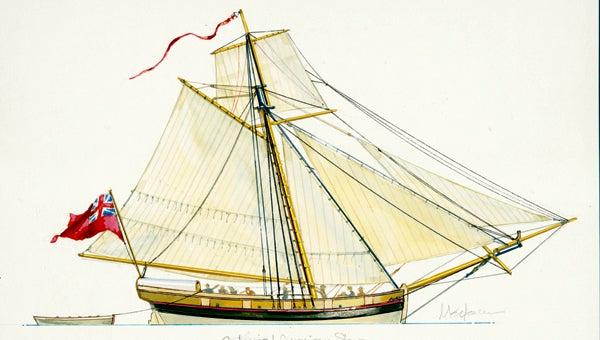Hail, Caesar: Author Duffus to talk pirates at the Turnage
Published 8:06 pm Saturday, February 8, 2014

MELBOURNE SMITH/BLACKBEARD ADVENTURE ALLIANCE | CONTRIBUTED
AHOY, MATEY! Melbourne Smith’s painting skills depict his version of Blackbeard’s sloop Adventure. The painting was commissioned by the Blackbeard Adventure Alliance.
Pirate history and pirate lore — sometimes the two are mingled, causing distortion.
That’s an issue historian and author Kevin Duffus will explore during his multi-media presentation — “Blackbeard’s Black Pirates: Their Origins, Their Identities, and Their Fates” — he will give at the Turnage Theater at 2 p.m. Feb. 16. The lecture is sponsored by Friends of the Brown Library and the N.C. Humanities Council. The event is free and open to the public.
Among the presentation will be remarks about the fate of a black man associated with Blackbeard — was he executed by hanging, did he escape execution or was he pardoned? Duffus believes he knows the true answer.
That black man — Caesar — was among the 60 black slaves that joined 40 white men on Blackbeard’s ship Adventure. Records provide information about 20 of those black slaves, according to Duffus. Except for Caesar, an exhaustive search of those records revealed nothing about the other 40 slaves, Duffus notes.
After wrecking the Queen Anne’s Revenge in Beaufort Inlet in 1718, Blackbeard used the sloop Adventure to transport the 40 whites and 60 blacks to Bath. Duffus said pirate historians tout this information as an example of how racially diverse pirate crews were — that they were multicultural, transnational and all-inclusive.
Most of those blacks were used as slave labor on the plantations around Bath, Duffus said.
The fate of some of the slaves, such as Caesar, continues to be debated, Duffus said. It’s within that debate where history and lore get mingled and distorted, he said.
Caesar
A popular, but untrue, story concerning Caesar has him being executed in Virginia after Blackbeard and some of his crew were killed in a battle with British forces off Ocracoke Island. Caesar, according to Duffus, was not executed but continued to work as a slave in the Bath area.
“If you were to go to Beaufort and tour the Queen Anne’s Revenge exhibit, which I did (in January) just to double check to make sure all my facts are correct, there’s only one reference to any black member of Blackbeard’s crew, and that’s Caesar,” Duffus said. “According to the Queen Anne’s revenue project, Caesar was executed in Virginia, completely ignoring the fact that that Caesar was in Tobias Knight’s estate inventory six months later.”
Duffus takes this view of Caesar: “Caesar is, most likely, Beaufort County’s earliest famous black resident.”
“Caesar, clearly, was a slave who left with these men. I won’t call them pirates when they left Bath. They came back as pirates. … They left after all these Spanish treasure ships wrecked off the coast of Florida. That’s how they got into it in the beginning,” Duffus said. “Caesar was clearly present when the La Concorde (which became the Queen Anne’s Revenge) was captured off Barbados. … Caesar, almost certainly, was there to interpret. You’ve got these African slaves who just arrived from Africa. They can’t speak English, but Caesar can. Caesar, presumably, could speak whatever West African language was common in the time. Now you’ve got a slave who’s on a pirate ship who’s assisting pirates in capturing other slaves and bringing them back to Bath.”
Caesar, as the story goes, was the black pirate that Blackbeard raised, or brought up as a child, and the person Blackbeard entrusted with igniting the Adventure’s black-powder stores to destroy the ship and its men if the pirates were subdued during the battle off Ocracoke Island on Nov. 22, 1718, to prevent their capture and avoid the indignity of being hanged in public. For whatever reason, Caesar did not carry out Blackbeard’s orders.
A question raised
Duffus questions that account: Why would an ordinary crew member, and a slave at that, be willing to do such an act, essentially committing suicide? Duffus will offer an explanation during his presentation Feb. 16. He’ll also explain how Caesar and others from Blackbeard’s crew were not hanged, as many people believe.
“I know exactly how they escaped the gallows … they were pardoned. They didn’t run away or anything. The reason they were pardoned is that part of his crew — six members of his crew — were arrested in Bath. They weren’t out at Ocracoke. The pardon came from the king,” Duffus said. “There were two pardons involved. There was an initial pardon. Great Britain was getting ready to declare war on Spain. All of these guys who used to be privateers became pirates because they just couldn’t stop, they couldn’t help themselves. They had to keep doing the same old thing. Back then, these countries needed these privateers to help supplement their naval forces.”
So, these countries had to find a way to hire the pirates as privateers, who would ostensibly be “honest men,” Duffus said.
“They were not going to hire criminals, so the king decided give them a pardon. He issued the pardon, and some surrendered, but some didn’t,” Duffus said. “In the case of Blackbeard, he surrendered, but he had committed a number of acts of piracy that happened after the (pardon) date. Then, the king’s Privy Council said, ‘We’re going to have to send out another pardon,’ because the results were not that good.”
The second pardon was arranged in such a way that a pirate was forgiven for any act of piracy committed before the pirate became aware of the pardon, Duffus said.
The pirates executed in Virginia were pirates who had been at Ocracoke.
“They weren’t executed because they were pirates. Even Blackbeard himself would have been pardoned, had he survived — except for one thing. They fired on the king’s colors, the king’s men first,” Duffus said. “That’s treason. So, that’s why some were executed and some weren’t.”
Valuable
Duffus said the 60 slaves on the Adventure were valuable. They were the “treasure.”
“Caesar was valued in Tobias Knight’s inventory at 60 (British) pounds sterling. There were 60 slaves, all of about the same age, and so that’s 3,600 pounds sterling. … The face value of this amount of money is something like $600,000 or $700,000, but the labor value of those 60 slaves in today’s dollars can be computed to $8 million,” Duffus said.
Pat Mansfield, with the nonprofit Blackbeard Adventure Alliance, said Blackbeard’s pirates knew the value of slaves, in part, because some of those pirates were the sons of Bath planation owners.
“And what did Beaufort County and Port Bath, that plantation society, need? What was the critical need that they had to have? The importation of a labor force,” she said. “So, it is all about economic development, which is right now the buzzword.”
Duffus wants Beaufort County residents to better understand their county’s Blackbeard heritage and what it means to them and the county.
“When this lecture concludes, if we could have one young person walk out of the Turnage Theater who’s suddenly taken an interest in their family history and the county history, then we’ve succeeded,” Duffus said.






